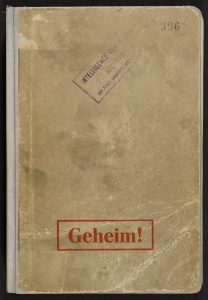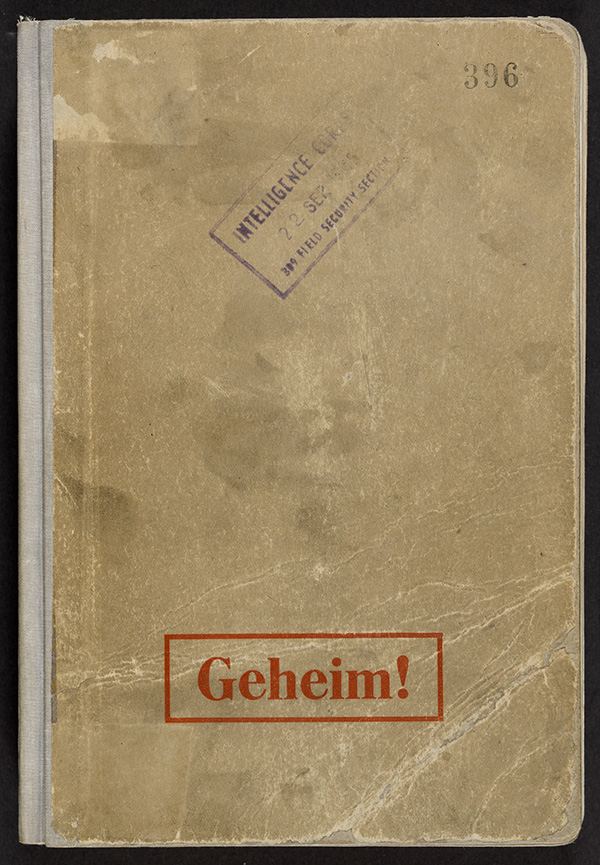It’s 1940; Nazi Germany has gained air supremacy over the RAF and has succeeded with Unternehmen Seelöwe (Operation Sea Lion), the invasion, occupation, and annexation of Great Britain to the Third Reich. The Germans have used the Sonderfahndungsliste G.B. (Special Search List G.B.) to identify and arrest ‘enemies of the state, traitors and undesirables, marked for punishment or death’, and they now turn their attention to institutions and organisations.
Would your workplace or organisation be on the list of the Reich’s most wanted?

As well as a list containing 2,820 names of politicians, writers, known intelligence agents, scientists and individuals, at the back of the book there is a directory of institutions such as newspaper offices, embassies, universities, trade unions and Masonic Lodges which the Nazis were interested in shutting down. Members would be taken into ‘protective custody’, and the infrastructure of every area of British society would be swiftly dismantled and destroyed.
The ‘Black Book’ would have been useful to the Nazi occupation authorities, as it offered detailed information on a wide range of topics concerning Britain. The ‘Black Book’ was a product of the SS Einsatzgruppen, compiled by SS-Oberführer Walter Schellenberg, the head of counter-espionage and part of the Reich Security Directorate. It is essentially a ‘Who’s Who’ for Nazi detainment.
Looking back at Nazi Germany during February 1933 you can see how Hitler was getting closer to his goal of having complete control of Germany and banning his rivals, such as the Communist parties. At the end of the March elections the Nazi party was the largest single political party and Hitler was gaining enough power to issue new laws without consulting parliament.
With the Nazis the only legal political organisation in the country, and other parties dissolved or banned, no-one could now challenge them legally which made being in opposition very dangerous. The German SD (Security Service) and Gestapo (Secret State Police) had many informants, and hunted down and eliminated any opponents to their regime. With Heinrich Himmler the head of the SS, none of the crimes committed by the Nazis were investigated.
Just as in Nazi Germany, if England was invaded the Nazis would look to gain total control and remove any threats or opposition to their views or anti German feeling in Great Britain.
With Britain under the Nazi regime religious teaching would be banned; many catholic priests would be arrested and the Catholic Youth League would be broken up. In the book ‘Operation Sealion’ by Peter Fleming, Hitler is quoted describing the Church of England as “nothing but a tool of Empire power politics”, with the Roman Catholicism being no better in his view.
Public schools and universities were also on the list, as they have for centuries educated and politically orientated the Britain’s political leadership. There were about 150 Public schools at the time, with the most distinguished being Eton, Marlborough, Westminster and Rugby. SS-Oberführer Walter Schellenberg gave a brilliant critique of the public schools’ system, stating that “the one half of a per cent of children who attend public schools will eventually occupy about 80 per cent of all important social and political posts”, and warned the invading officers not to put their children down for Eton which “is sold out until 1949”. He also listed those at Oxford and Cambridge for special attention, claiming they were “specifically active in anti-Nazi propaganda”. Leading professors, too, were targeted for immediate arrest, with the justification that educated people from these backgrounds represented English ideals and devoted their lives to promoting the interest of the English ruling class.
The Boy Scout movement was also targeted in the book, probably because of the importance of the Hitler Youth in Germany. The Boy Scout movement was described as representing “a powerful instrument of British cultural propaganda and ideal sources of information for the British Intelligence Service” and was regarded as a dangerous spy organization by the Nazis. Founder of the movement and first Chief Scout Lord Baden-Powell was perhaps more justifiably targeted in the ‘Black Book’, as he had been run as an agent against Germany during the Great War of 1914-18.
The Freemasons would also be targeted, just as they had been in Nazi Germany, when Hitler came to power. During the occupation of the Channel Island, Masonic Lodges were universally shut down. Hitler hated the Freemasonry, and described it to his Staff in 1942 as “an immense enterprise of corruption” and “a handful of men of men who are responsible for the war”. Its rituals, he considered, “transformed men who were quite sane and sober in their ordinary lives into informed apes”, and former Freemasons were only allowed to become Nazis if he gave his personal approval.
Hitler told his listeners, “I grant absolution only to men whose entire lives bear witness to their indisputably nationalist feelings.” Walter Schellenberg had similar views on the Freemasons, and saw signs of Jewish domination within the organisation, which he viewed as “a dangerous weapon in the hands of British plutocrats against National Socialist Germany”. Just as in the Nazi invasion of Jersey and numerous countries in Europe, not only Masonic Lodges but also churches, libraries, museums and inevitably synagogues would be ransacked, and furnishings and regalia would either be seized and taken to Berlin for display or destroyed. Meanwhile, members of these establishments would be examined and questioned.
Other targets for Nazi investigation would be the police force and the British Intelligence Service, which “has contributed in no small measure to the creation and preservation of the British Empire”. Within the Black Book there is an ‘Informationsheft’ and booklet describing with some accuracy the locations for each branch, along with the details of forensic laboratories and Special Branch indexes to be investigated.
The Salvation Army was seen as ‘internationalist’ in its outlook, and therefore would be closed and its members subjected to arrest and questioning.
In addition to the ‘named’ list there was also a general list of organisations under suspicion, and again, membership or connection with any of these would also have led to arrest and/or detention. These included political, governmental and legal organisations, the army, educational institutions, press and broadcasting corporations, emigrants, and Jews mentioned in the 144 pages of this section of the Black Book.
Thankfully the commitment and sacrifice of the brave ‘Few’ hampered the attempts of the Luftwaffe to gain air supremacy over England, and Hitler was consequently forced to cancel the planned invasion of the Britain. Only the Sonderfahndungsliste G.B. remains to give us a frightening glimpse of the Nazi plans for Great Britain in 1940. You can browse the list, newly translated from German into English, for free on Forces War Records.

